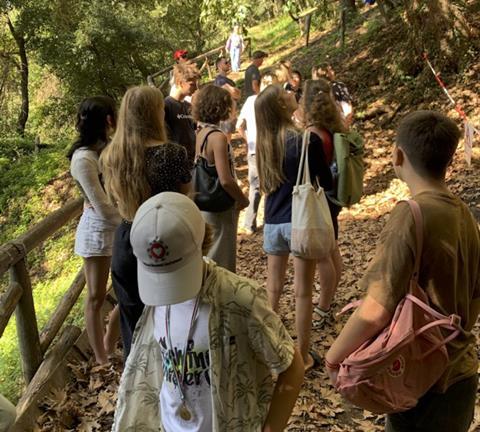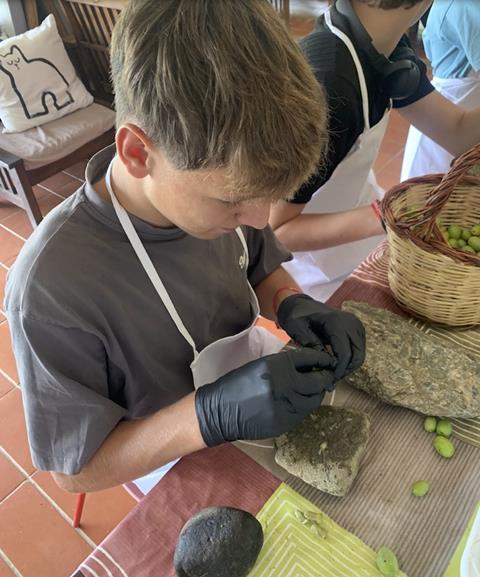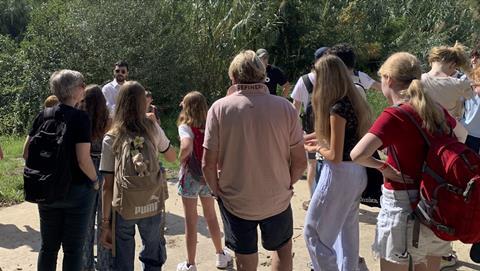In today’s increasingly digital landscape, residential trips provide crucial offline experiences for students. Dr Martina Geromin, co-founder of School Beyond Limitations, shares how they can help students develop social skills, cultural awareness and confidence while challenging misconceptions about online education.

Residential trips provide important, immersive, hands-on experiences for all children, regardless of their school setting. For those children who attend an online school, creating opportunities for physical adventures that help to build face-to-face social interactions, encourage teamwork and support personal growth, they become ever more valuable.
Even in traditional bricks and mortar school environments, online interaction in lessons during the school day and outside of it, is very much a ‘normalised’ way of life for young people today. Yet being offline is equally important, if not more so.
Residential trips which take children away from their usual day to day activities, allowing them to connect more deeply with their peers in an in-person setting, will enhance their emotional wellbeing and help to cultivate that sense of belonging that we all need to feel as human beings.
Being away from our usual surroundings often heightens our emotional intelligence, providing more spiritual learning opportunities in a way that allow us to work on the softer skills like problem-solving, dealing with conflict and socialising with others in respectful and mindful ways. Engaging in challenging tasks in a real-world context can also encourage young people to listen to each other more carefully, teaching tolerance and patience.
Breaking down hierarchies: student-led residential experiences
Online students are often used to working alongside an array of international cultures, in terms of the diversity of their classroom peers. Where residential trips are concerned, they provide an extension into that world of multi-cultural sensitivity, helping students to integrate with their peers and build friendships on a more personal level.

For our school, an important aspect of residential trips is the removal of stereotypical hierarchies between students and teachers, which can result in barriers to learning and a feeling of ‘them and us’. Our objective is always to nurture the whole person and so we like to get our students involved in making the decisions and in choosing which activities interest them personally or challenge them academically.
When selecting which countries to visit and activities to participate in, we listen to what our students want. This is their journey and their experience, so we want it to be engaging and worthwhile in a way that resonates. At school we have a residential committee made up of students and teachers who will discuss ideas and work with professional travel organisers to create the perfect adventure.
From Rotterdam start-ups to Dolomites music projects
While on a residential in Rotterdam, our students were placed into random groups and tasked with creating their own start-up business in one week. By the end of the week, they needed to have designed a product and written a business plan. Some of the product ideas were so good that they would have made viable real-world businesses. Some students have even progressed with their own ventures as a result.
Likewise, we arranged a nature-themed trip to the Dolomites in Italy, where we explored the incredible mountainous region. During this residential, our students were tasked with writing, composing and performing an anthem for our school alongside a composer from LA, an opera singer and pianist, who were all there to support our students with their quest. The result was exceptional, and they delivered a wonderfully uplifting performance at the end of the week. We have also visited Spain and Italy on multiple occasions, as well as Austria and Finland. We have also hiked in Morocco and South Africa and are considering future residential trips in countries such as Romania, Vietnam and Kenya.
Digital detox: the benefits of going offline during residentials
Residentials, although fun, are not simply an entertainment exercise. They are designed to help students to connect with each other without a set of fixed rules and to emphasise the positive experience of being offline. For one trip we made the agreement with students and staff to hand all devices in at the start of the trip and to go completely offline (aside from having one emergency phone for urgent parental contact), in this case it was about creating that balance, that equality and fairness for all.
We found that starting on an equal playing field in terms of being device-free, allowed students and staff to enjoy being in the moment without fear of missing out or feeling compelled to scroll social media platforms. In an ideal world going completely offline during all residentials would be a positive step, although that can be challenging today in our digital-led world, especially when such a decision needs buy-in from both parents and students.
We found that starting on an equal playing field in terms of being device-free, allowed students and staff to enjoy being in the moment without fear of missing out or feeling compelled to scroll social media platforms.
For our students, being on a residential trip is all about being together, building friendships and being present in the moment. Wherever possible, we look to foster an entrepreneurial team atmosphere on our residential trips, one that is free from hierarchy and where everyone has a voice and is able to guide and support each other.

Using this approach has led to a number of revelations; namely feedback from the travel organisers we have worked with and also the local guides and communities that we have met along the way – who are often astonished by our students’ level of confidence and maturity. We are told that our students ask lots of questions, without fear of getting an answer wrong. They interact with people from all walks of life with compassion and understanding. They are global citizens who are open minded and accepting of all cultures and they don’t seem to fear challenge or shy away from putting themselves forward.
Challenging misconceptions: how online students can excel in social settings
In some cases, one might argue that this feedback goes against the grain of what many people have previously perceived online schooling to be. One might be forgiven for believing the myth that online students are somehow less confident or socially awkward; yet the reverse is very often true. Residential trips simply provide the platform to explore these qualities in a real-world scenario.

Dr Martina Geromin is the co-founder of School Beyond Limitations, an international online school head-quartered in the UK (London) providing primary, secondary and sixth form education for students aged 4 to 19 years. For more information visit www.school-beyond-limitations.com.










